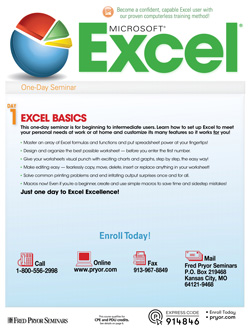No more blame games, “it’s not my job” attitudes or finger-pointing. Managers will learn how to empower employees to take responsibility!
Stop the negativity before it brings down productivity and morale!
This seminar will help you learn to flex your managerial skills to get everyone to pull together and work side by side to achieve the organization's goals in the most efficient, productive way possible. And the best part: the company benefits because overall productivity and morale increases. Also, an accountable workforce basically manages itself! Imagine being freed up to focus on something other than day-to-day drudgery and disciplinary issues. Employees benefit because they are empowered and held accountable for their own success and that of the company as well. They will look forward to more challenges and increasing company profitability.
You will discover how to help your employees realize the importance of every position, including their own. You will inspire your employees to embrace their responsibilities and improve their overall job performance. This empowerment will have a tremendously positive effect on your company. This new environment will bring:
- A happier, motivated workforce to succeed
- An organizational culture that encourages honesty and personal responsibility
- Employees that enjoy their work, and continue coming back for more
- Less turnover and loss in productivity
- And so much more!

No more blame games, “it’s not my job” attitudes or finger-pointing. Managers will learn how to empower employees to take responsibility!
Help your employees experience the satisfaction of taking ownership, not just of their jobs, but of the organization as a whole. Establish a culture of accountability in which all employees, from the CEO to entry-level employees, accept responsibility for their own success and for their role in the success of the entire organization.
Download BrochureWhat does accountability mean to you and your organization?
Dive right in to the most important part of the session – the meaning of accountability and why it is critical to the success of your company. Refl ect on your own beliefs to see positive change within your department and organization. Plan to learn:
- How accountability motivates us to do our best and leads us to greater satisfaction within our jobs and therefore, our lives
- How to create a sense of “we’re all in this together”
- Techniques for aligning employee performance goals with the organizational mission and vision
- Identify high-performance behavior: what it looks like, what it entails and how to emulate it
- How to set accomplishable goals to encourage employee ownership
- Tips for conveying clear and specifi c results and expectations
- A constructive, blame-free method for holding people accountable
How do you communicate in a culture of accountability?
To create a culture of accountability, you need to be resolute in your efforts and prepared for open communication. There will be questions and you will be ready with the right answers at the right time.
- Strategies for establishing a culture built on trust, mutual respect and personal responsibility
- Learn the best path to accountability: a collaborative leadership
- Procedures to increase employee involvement and give them opportunities to fl ex their leadership skills
- The benefi ts of cross-training among departments and divisions: unearth hidden talents, eliminate redundancies and improve relationships
What are some obstacles you will need to overcome?
The only thing that is constant is change. Yet, as creatures of habit, it is change that impacts us most. It may even scare us. It should be no surprise that with this new culture of accountability, there will be roadblocks to change. Be ready.
- Identify existing issues that are barriers to accountability
- How to handle employees with unacceptable behavior, including fi nger-pointing, not taking responsibility for their mistakes and lacking in professional manners
- Drop the guilt and quit worrying about other people’s feelings for holding them accountable
- Identify and plan for accountability issues before they wreak havoc
- How to hold virtual/global/distributed workforces accountable
How do you maintain an accountability culture?
Once you have an accountability culture in place, it is paramount to prevent backsliding to your previous ideology. You need to stay on top of the change cycle. Review and analyze performance. Reward success and be sure to accentuate the positives of this new practice.
- Develop strategies to keep employees on track
- Document and share progress with employees
- Coach for engagement and ownership
- Be honest in your own communication and behaviors
- Remember, success breeds success: recognize and reward accountability
- Reward performance that goes beyond stated expectations
- Involving employees in the hiring process saves you time, increases their commitment AND helps you hire the right people


